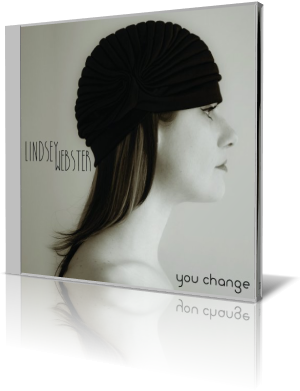“In an age where everyone is trying so hard to be someone, Lindsey
Webster just sails along as … herself.” Those words accompany the bio on
vocalist Lindsey Webster’s You Change (Maxophone Records,
2015).
The variable lineup of musicians who perform with Webster consists of
Keith Slattery, keyboards, grand piano on “Bleed”; Tony DePaolo, guitar;
Reggie Earls, background vocals; Dan Hickey, drums; Mike DeMicco,
guitar; Jessie Murphy, bass; Manuel Quintano, percussion; Jen Cohn,
background vocals; Ryan Joseph, violin and viola; Brandon Morrison,
bass; Vito Petroccitto, guitar; Ken Gioffre, sax; and Jeff Jamal, rhythm
guitar. Slattery, DePaolo and Hickey appear on most tracks.
The opening track, “Fool Me Once,” is a mellow groove, highlighted by
Webster’s soothing voice, a soul-funk bass line Hickey’s steady rim
shots. DePaulo’s guitar takes on a haunting, ethereal quality. Webster’s
voice is like a wind instrument, perhaps an alto flute, especially
during her wordless chant toward the end.
“Lost One” is a 3 /4 ballad of sorrow, the pain of losing a loved one
album is dedicated to Webster’s mother, Barbara Moon Webster, who died
in 2014 at the age of 64. Lindsey pours her soul into this one,
expressing her thoughts and feelings about their relationship and the
emptiness that comes with the loss.
“I’m Strong” has a touch of disco-meets-90s dance music. This upbeat
song shows Webster’s range and Cohn mix haunting chants in the
background with a stellar, high-pitch wail worthy of Mariah Carey.
Jamal’s rhythm guitar effects brings to mind some of the Bee Gees’
Saturday Night Fever hits. One can almost hear a bit of Chaka Khan
in some of the background chants.
Webster grew up in Woodstock, New York. With a heavy emphasis on arts
and music, her grade school had a progressive music program where she
cultivated a deep love of music, learning to play the cello. After 10
years, often in first chair, she moved to New York City to attend
Fiorello H. LaGuardia School for Music, Art and Performing Arts. She
later transitioned from strings to voice.
Webster’s style draws comparisons not only to Carey, but also to Anita
Baker and Sade. The music is billed as soul and R&B, but that it’s
presented in a way more reminiscent of the 1970s and ’80s than more
contemporary genres that lean heavily on drum loops, elements of hip-hop
and stifle instrumental solos. You Change isn’t heavy on solos,
but the musicians all get to express themselves, even if limited to
accompanying roles. Gioffre’s soprano on “Universe” is a perfect example
of this. DePaulo, Slattery, Murphy and Hickey loosen up quite a bit on
that track, as well. The finale is a symphony of haunting guitar and
piano leads, accented by riveting bass and drum play.
All songs were written by Webster.



